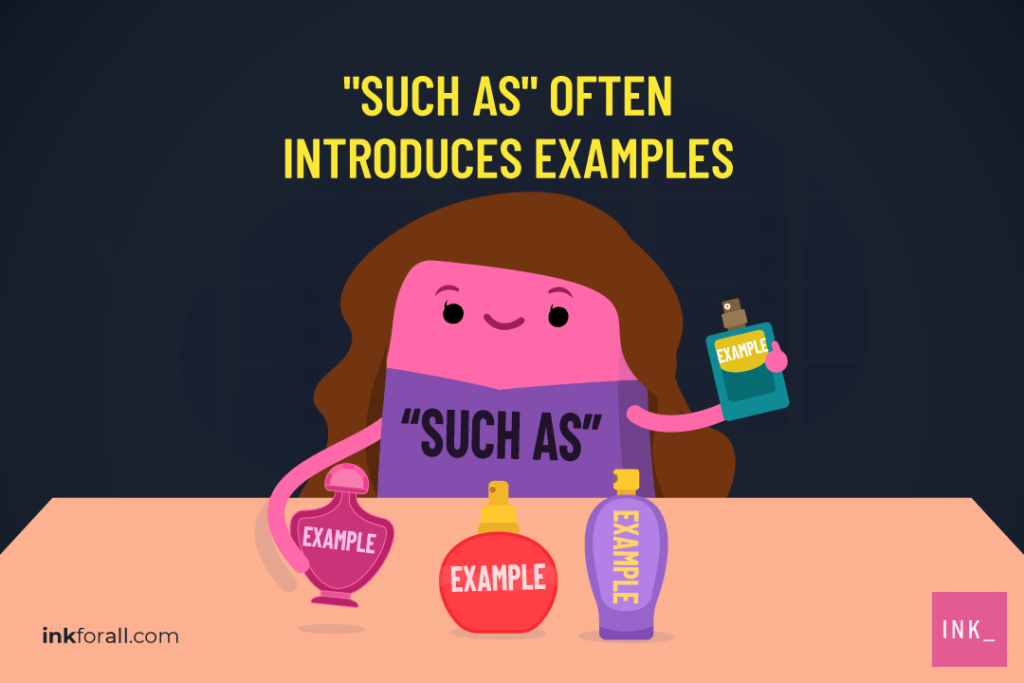The phrase «such as» is widely used in the English language, and it is almost impossible to go a day without using or coming across it. But, using a word or a phrase frequently does not mean you know how to use it correctly. There is a lot you need to learn and this article will cover everything.
The phrase «such as» is used as an introduction to an example or series of examples of something mentioned earlier. An example depicting the use of «such as» is: You must have a form of identification, such as a national ID card or driver’s license on you when going out.
You should encounter no problem while learning how to use the phrase correctly. We will make it very simple and easy to understand, so you will not encounter any complexity. Hop in and let’s discover everything about the phrase.
What Does The Phrase «Such As» Mean?
You must not use a word or phrase without having a deep understanding of it and if you have, you should try to find out all you can about the word. You are assured of communicating effectively when you understand a word beyond the surface.
For us to achieve easy and effective communication, we will look at some essential parts of the phrase «such as,» the meaning and the origin. You should be able to use the phrase effortlessly when communicating after reading this article.
The meaning of a word refers to the idea the word conveys when used in a sentence, what the reader infers when they see the word in a sentence. The origin of a word on the other hand refers to where the word was derived from, usually a root word, which is mostly from other languages.
So, What Does The Phrase «Such As» Mean?
The phrase «such as» has a wide range of meanings. Some people refer to it as an idiomatic expression that means something or of a kind mentioned earlier.
It is also used to introduce other examples of the type of thing you just mentioned. An example would be,
- The art museum in Dallas has a lot of exquisite paintings from artists, such as Leonardo Da Vinci and Pablo Picasso.
There is another meaning to the phrase «such as,» although it is now archaic and outdated, it is good to know it. It means «those who,» an example is,
- Such as promises to engage in lawful activities not only break their promise, but they are also dangerous if they do not fulfill their promise.
From the example above explaining the last meaning of the phrase «such as,» a person that is familiar with the modern English language will find it very difficult to comprehend. If you replace the «such as» at the beginning of the sentence with «those who,» the sentence makes a lot of sense.
Next, we will dive into the etymology of the phrase «such as.»
We will look at the separate origins of the words «such» and «as,» this is because «such as» is a phrase, not a word.
The «such» is from the Middle English word «such» (also swich, swulch, swilch, and swuch), this is from an Old English word «swelċ,» gotten from the Proto-Germanic «swalīkaz.»
And the word «as» is from the Middle English word «as» (variations of the word are als(a) and alswa). This is in turn from an Old English «eallswā» a reduced form of «also.»
This is the origin of the root words of the phrase «such as.»
Synonyms and Antonyms of the Phrase «Such As»
Our next focus is on the synonyms and antonyms of the phrase «such as.» First, we will examine some synonyms of the phrase.
- For Example
- Like
- In Particular
- For Instance
- Namely
- Similar To
- Suchlike
- Including
- Akin To
- Identical To
- Resembling
- Just Like
- Exempli Gratia (e.g.)
- As An Example Of
- As In
To make it more understandable, below are some examples to show how you can use the synonyms of «such as» as an alternative in sentences.
Examples with «Such As»
- Children born in the 2010s missed the best Nickelodeon cartoon characters, such as SpongeBob SquarePants and Avatar Aang.
- There are different consequences and motives for criminal activities, such as tax evasion, theft, and robbery.
Examples with the synonyms of «Such As»
- Children born in the 2010s missed the best Nickelodeon cartoon characters, like SpongeBob SquarePants and Avatar Aang.
- There are different consequences and motives for criminal activities, for instance, tax evasion, theft, and robbery.
On the other hand, the antonyms of the phrase «such as» are,
- Aside From
- Besides
- Except
- Apart From
- Excluding
- Leaving Out
- Exclusive Of
- Omitting
- Other Than
- Outside Of
- With The Exception Of
- Unlike
- All But
- Exempting
- But
Examples with the antonyms of «Such As»
- Jones expected to meet his room arranged but to his surprise, it had been emptied, except for his study table.
- One of the agreements David had to sign before commencing his duties in the organization was to make no deals with anyone asides from the company deals.
- Harry claimed he read all but the concluding part of the message so he could not decipher the message.
- Kane was ashamed of telling Olivia, his girlfriend that apart from changing a car tire, he had no clue of car maintenance.
These examples should show you how you can use the antonyms of the phrase «such as» in a sentence.
How To Properly Use «Such As» In A Sentence
In this session, we will look at a few tips and additional knowledge that will assist you in using the phrase «such as» in a sentence.
You use the phrase «such as» when you want to provide specific examples of something you are talking about. This means when you are talking or referring to something and you need to provide examples to explain better, you use «such as.»
Another thing you need to know when using the phrase «such as» is the accurate use of punctuation marks before and after the phrase.
You must not use a comma before the phrase «such as» if it is part of a restrictive clause. By restrictive clause, we mean if you take out the phrase the sentence does not make sense. If there is a nonrestrictive phrase, in the sentence, you must use a comma.
An example is you will find a lot of coniferous trees, such as spruce and pine in this forest. The phrase «such as spruce and pine» is nonrestrictive because if you take it out of the sentence, it still makes sense. You will find a lot of coniferous trees in this forest.
You also need to understand that if you are using examples that are not essential in making your sentence accurate and clear, you must add a comma before «such as» and also after the examples, except the example us at the end of the sentence. if the examples make your sentence clear and accurate, you can omit the commas.
We will look at situations you cannot use the phrase «such as.»
- You cannot use the phrase to compare things.
- You cannot use the word «as» on its own to introduce examples.
You should know that the phrases «such as» and «as such» are very different and cannot be used interchangeably because they do not have any similarity in meaning despite looking very similar. «As such» is used to give a reason for something but «such as» is used when giving examples to make a sentence clearer.
Illustrative Examples on how to use the phrase «Such As»
Here are some examples to simplify the explanations we have provided on how you can use the phrase «such as» correctly in a sentence.
- It is vital to remove the stalks of leafy vegetables, such as silverbeet and spinach before using them in your meal.
- Most western countries are ready to get rid of tariffs on different items such as electronics, foodstuffs, and solar panels.
- External factors, such as smoking while being pregnant is a major external factor that results in miscarriages.
- People with poor eyesight need to wear corrective lenses, such as contact lenses or eyeglasses.
- Since he received parole, he partnered with teenagers in trouble, trying to help them avoid getting into a life of crime such as he had.
- Explaining and defining abstract ideas such as friendship and love to children can be difficult and frustrating.
- The drugs prescribed for him were very effective in treating his sickness, but there were some adverse effects, such as dizziness and allergy reactions.
- The natural resources will continually deplete as long as activities such as mining and logging are still carried out.
- Different people believe their success is to be attributed to external causes such as luck and favor.
- The senator from the eastern part of the state constructed a hospital to treat emergencies such as accidents and fire burns.
With these examples, you should not find it difficult to use the phrase «such as» in your sentences.
Final Thoughts
You do not have to stress yourself out trying to figure out how to use the phrase «such as» correctly in a sentence.
All you need to do is read up and get the knowledge.
Shawn Manaher is the founder and CEO of The Content Authority. He’s one part content manager, one part writing ninja organizer, and two parts leader of top content creators. You don’t even want to know what he calls pancakes.
What does the phrase as such mean?
According to Collins Dictionary, the phrase as such can be used with a negative to indicate that some expression is not an accurate description of the actual situation. Someone could also use as such after a noun to show that they consider that thing to be separate from other things or factors. In American English, it most commonly means “in itself,” or “as indicated.”
According to Elite Editing, the phrase as such is commonly confused with the word therefore. Therefore is a conjunction, which is a part of speech that connects two words, phrases, or clauses. The word therefore means “consequently,” in its simplest form.
The term as such is also a conjunction but it acts different than therefore. As such means “in that capacity,” or “in and of itself.” The word “such” is a pronoun in this case. When someone uses the proper usage of the phrase as such, there must be an antecedent noun that the pronoun such refers to. One can test if the phrase as such makes sense in a certain context by asking themselves what the “such” in “as such” refers to. If someone is trying to decide between using as such and therefore, but the phrase could be replaced by “as a result,” use therefore instead.
For example, let us take the sentence, “Danielle is a seasoned professor, and _____ can tell the difference between a true emergency and a student making up an excuse.” Which conjunction, therefore or as such, would make sense in this sentence? Let’s start with as such.
Here, if the phrase as such was inserted into the sentence, it would read “Danielle is a seasoned professor, and as such can tell the difference between a true emergency and a student making up an excuse.” Here, the pronoun such refers to the antecedent noun phrase “seasoned professor.” As such is acceptable to use in this scenario.
If we were to insert the phrase therefore into the aforementioned sentence, it would read “Danielle is a seasoned professor, and therefore can tell the difference between a true emergency and a student making up an excuse.” If we replace “therefore” with “as a result,” the sentence makes perfect sense. Therefore, either “as such” or “therefore” can be used in this context.
However, in the following sentence only “therefore” would make sense: “Dogs are very loyal, and ______ will protect their owners no matter what.” Here, if one was to use the phrase “as such,” the sentence would read, “Dogs are very loyal, and as such will protect their owners no matter what.” This does not make any sense because the phrase as such has no antecedent noun for the pronoun “such” to refer to.” However, the blank can be replaced by the phrase “as a result.” Therefore, the word “therefore” works best in this context, and the sentence should read “Dogs are very loyal, and therefore will protect their owners no matter what.”
How can the phrase as such be used in a sentence?
The phrase as such can be used in a plethora of different contexts so long as the pronoun such has an antecedent noun to refer to. Below are a few examples of sentences in which “as such” is an appropriate conjunction to connect two phrases.
Timothy was a low-income foster child, and as such received free lunch at school. Here, the “such” in “as such” refers to the antecedent noun phrase “low-income foster child.”
Marjorie was a horrible English teacher, and as such, her students entered their next classes with little to know knowledge. Here, the “such” in “as such” refers to the noun phrase “horrible English teacher.”
What is the etymology of the phrase as such?
According to Grammarphobia, the phrase as such first came to be in the mid-17th century. The original form of the phrase was “as it is such,” or “as they are such.” It was first used in John Milton’s 1670 book The History of England in the below quote:
“True fortitude glories not in the feats of War, as they are such, but as they serve to end War soonest by a victorious Peace.”
Here, the phrase as such refers to the feats of war. The phrase has for the most part retained its original meaning but has also come to mean “in that capacity.” While many use it to mean something similar to “therefore,” be wary – this phrase still requires certain grammatical elements, namely an antecedent noun, to follow proper grammatical sense. Otherwise, it is considered incorrect usage.
What are synonyms for the phrase as such?
If someone wished to use a phrase with the same definition as the term as such, they could use one of many synonyms. People often use synonyms if they want to avoid repeating themselves or if they are trying to expand their own vocabulary. This list of synonyms for the phrase as such is provided by Thesaurus.
- intrinsically
- alone
- independently
- in essence
- by itself
- by and of itself
- per se
- of itself
- solely
- by its very nature
- by definition
- fundamentally
- virtually
- singularly
- in itself
Overall, the phrase as such means “in itself.” This phrase must be used with an antecedent noun so that the pronoun “such” has something to refer to. Many people tend to use as such as a replacement or synonym for the word therefore, but this is not always acceptable grammar.
Sources:
- https://www.thesaurus.com/browse/as%20such
- https://www.eliteediting.com.au/but-why-can%E2%80%99t-i-use-%E2%80%98as-such%E2%80%99-instead-of-%E2%80%98therefore%E2%80%99/
- https://www.collinsdictionary.com/us/dictionary/english/as-such
Kevin Miller is a growth marketer with an extensive background in Search Engine Optimization, paid acquisition and email marketing. He is also an online editor and writer based out of Los Angeles, CA. He studied at Georgetown University, worked at Google and became infatuated with English Grammar and for years has been diving into the language, demystifying the do’s and don’ts for all who share the same passion! He can be found online here.
Confusingly, there is more than one problem.
«as such» is 100% wrong and has no connection, at all, to the sentence.
(«as such» is simply the same as saying «so». For example, «I am tall, so, I have long legs».)
«as follows» is wrong.
(«as follows» or «in the following way» is used after you refer to some set of information. «The name can be written as follows — » «The result can be calculated as follows -» «The professor calculated the mass in the following way -«)
A bigger problem here: «divided» is totally wrong.
You could state «They are divided like this:» and then give the full list adding to the total.
OP simply meant:
«Here are some example numbers»
or
«Here are some national figures:»
or
«Some of the numbers which make up the 3.3 million are:»
Never, ever, try to write long sentences. (Particularly when dealing with numbers or statistics.) Just state accurately what you mean.
Regarding «as follows», if (for some reason) you wanted to use that phrase there, it would have to be tortured. Something like … «A few of the national statistics can be written down as follows:» or «Some example figures can be given as follows:» (Note — don’t do that, it’s just an example for non-native speakers of what «as follows» means.)
Regarding «as such» (which just means «so») it just has no connection whatsoever to the sentence. An example of «as such» might be «Pollution is killing 3.3 million a year, and, as such, it is the world’s biggest killer.»
Q: I generally see “as such” used to mean “therefore,” but I think it should refer to something just mentioned. It’s hard, however, to explain this to other people. Can you assist?
A: You’re right in thinking that the use of “as such” to mean “therefore” is frowned on.
The Oxford English Dictionary calls this usage “colloquial” (that is, more suited for speech than writing) or “vulgar” (commonplace or lacking refinement).
The word “such” in the idiomatic expression “as such” is a pronoun, and as a pronoun it’s supposed to refer to or stand for something already mentioned—an antecedent.
A sentence shouldn’t include the phrase “as such” unless there’s an antecedent that answers the question “as what?”
First, we’ll take a look at the expression’s accepted meanings and their histories.
The phrase first showed up writing in the mid-17th century, according to the OED.
Its original form was a bit longer—“as it is such” or “as they are such”—and its meaning was “in itself.”
John Milton used the phrase that way in The History of England (1670):
“True fortitude glories not in the feats of War, as they are such, but as they serve to end War soonest by a victorious Peace.”
In that example, “such” refers to the previously mentioned “feats of war.”
A slightly later example, using the phrase in its shorter form, comes from Ralph Cudworth’s The True Intellectual System of the Universe (1668):
“If Matter as such, had Life, Perception, and Understanding belonging to it.”
In the example above, “such” refers to the previously mentioned “matter.”
The OED says that in the following century “as such” acquired another meaning: “as being what the name or description implies,” or “in that capacity.”
The dictionary’s first example in print for this sense is from Richard Steele, writing in The Spectator (1711):
“When she observed Will. irrevocably her Slave, she began to use him as such.”
Note that here again, the pronoun “such” refers to something already mentioned—in this case, “her slave.”
This more recent example comes from a British legislative act (1911): “The trade or business carried on in the house or place by the licence holder as such.”
In that sentence fragment, “such” refers to the already mentioned “licence holder” (the act uses the British spelling of “license”).
Now for the frowned-on usage, the “vulgar” or “colloquial” one in which “as such” has no real antecedent and means “accordingly,” “consequently,” “thereupon,” or “therefore.”
This usage was first recorded in the 18th century but has never gained acceptance, probably because it’s ambiguous.
These two examples from letters written in the early 1800s are good examples of the ambiguity of “as such” when it’s used in this vague sense:
“I very much longed to hear from you … and as such I did not the least esteem it for its having been delayed for the reasons assigned.”
And: “H. R. H. Princess Augusta … motioned for me to come to her Highness. As such she addressed me in the most pleasant manner possible.”
See what we mean? Neither sentence answers the question “as what?”
Once again, “such” is a pronoun here, and “as such,” it requires an antecedent.
Check out our books about the English language
“Such as” is a common phrase, but how you use it can affect your text’s meaning.
Let’s take a closer look at exactly when to use a comma before such as with some examples along with key dos and don’ts.
Trick #1: When to use a Comma Before Such As
Step 1: Remove the part of the sentence that starts with “such as“.
Step 2: Ask yourself, “Does the meaning of the sentence change?”.
Step 3: If the answer is “no,” then you definitely need to use a comma before “such as“.
This means the phrase is a nonrestrictive clause, or not essential to the sentence.
You need a comma to make this fact clear. The comma is like the glue that holds the two independent parts of the sentence together.
You could remove the nonrestrictive phrase “such as dermatologists,” and the rest of the sentence would still carry the same meaning. “Doctors have to go to medical school for a long time” is true either way.
Including the example of dermatologists adds an explanatory detail.
Trick #2: When NOT to use a Comma Before Such As
Step 1: Remove the part of the sentence that starts with “such as“.
Step 2: Ask yourself, “Does the meaning of the sentence change?”.
Step 3: If the answer is “yes,” then you don’t need to use a comma before “such as”.
This means the phrase you removed is a restrictive clause and is essential to the sentence.
Since the phrase is a necessary part of the sentence, it’s already naturally part of the sentence flow. As a result, you don’t need any comma glue to hold the sentence together.
In this example, removing “such as cows and dogs” would suggest that all animals have four legs.
That would exclude birds, fish, and other animals that have no legs at all and insects such as spiders that have way more appendages.
Main Comma Before Such as Takeaways:
- To determine whether you need a comma before such as, try removing the phrase starting with “such as” and see if the meaning changes.
- Restrictive clauses starting with “such as” don’t need a comma.
- Nonrestrictive clauses beginning with “such as” should start with a comma.
- Restrictive clauses are essential, while nonrestrictive clauses can be removed without changing the meaning of the sentence.
Examples of Using a Comma Before Such As in a Sentence
As you get the hang of commas and “such as,” we have a tip to help make it easier.
All you have to do is remove the phrase and see whether the rest of the sentence is still true to the original meaning.
If you take out “such as lemon and lime,” the meaning of the sentence changes. You’d suddenly be saying all fruit has a citrus flavor rather than clarifying that fruits like lemon and lime taste like citrus.
In these examples, it could go either way. It’s important to know the intent of the writer.
If the author isn’t good at all sports and soccer and basketball are examples, then a comma is necessary.
However, if the subject is good at some sports but not soccer and basketball, then no comma should be used.
What Does “Such As” Mean?
“Such as” is a more formal synonym for “like”. It frequently introduces an example. There may be one item or several, all elaborating on the idea that came earlier in the sentence.
Thanksgiving, Christmas, and St. Patrick’s Day are all examples of holidays the author loves.
More on Restrictive vs. Nonrestrictive Clauses When Using Such As
Putting a comma in front of “such as” will depend on whether the clause that comes next is restrictive or nonrestrictive. Don’t worry—this might seem like a complicated concept, but you’ll be a pro in no time.
Restrictive Clauses: You Don’t Need the Comma
A restrictive clause is also known as an essential clause because it’s a necessary part of the sentence. In other words, if you remove a restrictive clause, the meaning of the sentence would no longer be the same. Restrictive clauses that use “such as” typically do not require a comma first.
If you remove “such as crossword puzzles and Sudoku” from the sentence, the meaning will change. That makes the clause restrictive, and it would not require the use of a comma.
Nonrestrictive Clauses: You Need the Comma
A nonrestrictive clause with “such as” at the end of a sentence must begin with a comma and end with a period.
A nonrestrictive clause isn’t essential to a sentence. It may describe the object of that sentence, but if you omitted the clause, it won’t change the sentence’s overall meaning. We use these clauses to include extra details in your sentence.
It’s common to use commas to help separate a nonrestrictive clause from the rest of the sentence. A nonrestrictive clause beginning with “such as” is in the middle of a sentence, it’s usually offset with commas.
Is it good to remind the audience that they make great wine in Tuscany? Sure, but even if you remove the phrase“where they make incredible wine,” the rest of the sentence carries the same meaning.
“Such as” can be a handy tool when utilized correctly. Use it to expand on an idea, paint a more specific picture, and be sure your audience understands what you’re trying to say. All it takes is a little curly comma, and you’re in business!
Do you Need a Comma Before Such As? Test out Your New Skills
Comma Before «Such as» Question #1
A. Restrictive clauses need a comma.
B. Restrictive clauses don’t need a comma.
Correct!
Wrong!
The answer is B. A restrictive clause is necessary to complete the sentence’s meaning. Since it is an essential part of the sentence, it is not set off with a comma.
Comma Before «Such as» Question #2
Correct!
Wrong!
The answer is FALSE. Whether or not you need a comma before “such as” depends on if the phrase starting with “such as” is a restrictive or nonrestrictive clause.
Comma Before «Such as» Question #3
A. Skills, such as critical thinking, are the key to recognizing potential “Fake News” online.
B. Skills such as, critical thinking are the key to recognizing potential “Fake News” online.
C. Skills such as critical thinking are the key to recognizing potential “Fake News” online.
D. None of the above.
Correct!
Wrong!
The answer is C. If you remove the phrase “such as critical thinking,” the meaning of the sentence changes. This means that the phrase is a restrictive clause and a crucial part of the sentence. As a result, you don’t need a comma before “such as.”
Comma Before «Such as» Question #4
Correct!
Wrong!
The answer is TRUE. Nonrestrictive (or nonessential) clauses aren’t a critical part of the sentence. Instead, they often add information that’s nice to have but not necessary to the sentence’s meaning.
Comma Before «Such as» Question #5
A. Soft natural light such as early morning rays is a photographer’s best friend.
B. Soft natural light, such as, early morning rays, is a photographer’s best friend.
C. Soft natural light such as early morning rays, is a photographer’s best friend.
D. Soft natural light, such as early morning rays, is a photographer’s best friend.
Correct!
Wrong!
The answer is D. If you remove “such as early morning rays,” the meaning of the sentence does not change. This means it is a nonrestrictive clause and not a crucial part of the sentence. Since it is a nonrestrictive clause, you need a comma before “such as.”
Read More: How To Use Commas In Your Writing
When To Use “Like” or “Such As”
powered by
LanguageTool
There’s a subtle but important difference between “like” and “such as.” Read on to find out what it is.
What is the difference between “like” and “such as”?
- Like suggests comparisons, but isn’t necessarily inclusive. Such as introduces an inclusive set of categories or examples.
- The first sentence implies that Thomas enjoys activities that are like hiking, kayaking, and bird-watching (but not necessarily those exact activities) whereas the second sentence implies that his hobbies include painting, writing, and sculpting.
- ○ Thomas enjoys outdoor activities like hiking, kayaking, and bird-watching.
- ○ Thomas has many hobbies, such as painting, writing, and sculpting.
How Do You Use “Like” and “Such As”?
Consider the following sentences:
I’ve watched several movies like “Captain America,” “Iron Man,” and “Spider-Man.”
I’ve watched several movies such as “Captain America,” “Iron Man,” and “Spider-Man.”
Although your audience may not notice it, the use of like and such as changes the meaning of the sentence. Below, we’ll go over when you should use like and when you should use such as.
When To Use “Like”
If you’re making a comparison, then the word you should use is like.
Louie has traveled to several places like New York City, Chicago, and San Francisco.
The sentence above implies that Louie has traveled to several places comparable to or like New York City, Chicago, and San Francisco, but he hasn’t necessarily visited those particular places.
Here’s another example of like in a sentence:
Suzanne enjoys desserts like brownies, cakes, and cookies.
Again, the use of like in this sentence indicates that Suzanne eats desserts that are like brownies, cakes, and cookies but doesn’t necessarily eat those specific desserts.
Because like works when making a comparison, you can often find them in similes:
Jack is strong like an ox.
When To Use “Such As”
Such as implies an inclusive set of categories or examples.
Louie has traveled to several places, such as New York City, Chicago, and San Francisco.
This sentence indicates that Louie has traveled to several places, including New York City, Chicago, and San Francisco.
- Suzanne enjoys desserts such as brownies, cakes, and cookies.
Similarly, this sentence states that Suzanne enjoys eating desserts, including brownies, cakes, and cookies.
Should You Add a Comma Before “Like” or “Such As”?
Using a comma before like or such as depends on whether the clause is restrictive or nonrestrictive. A restrictive clause adds necessary information to the noun and, if it were to be removed, changes the meaning of the sentence. Restrictive clauses do not need commas; therefore, one isn’t required even if it includes like or such as. For example:
Vegetables such as broccoli and cauliflower are packed with nutrients.
Elizabeth often reads books like “Harry Potter” and “The Hunger Games.”
Nonrestrictive clauses add information to a sentence, but don’t necessarily change the meaning if removed. Using like or such as in these types of clauses requires commas.
Some dog breeds, such as French Bulldogs, have short snouts.
She wanted a fun theme, like Balloon Bonanza or Pretty Pirates, for her birthday party.
The Difference Between “Like” and “Such As”
You may get away with swapping out such as with like, but if you want to be as grammatically correct as possible, you should remember the difference between like and such as. Like is used for comparisons and isn’t inclusive, whereas such as is used to introduce categories or examples that are inclusive.
Although your audience may not notice the difference between these two words, they will definitely notice blatant spelling and grammar errors. That’s why it’s a good idea to use LanguageTool as your writing assistant. This multilingual text editor will detect and correct all types of mistakes to ensure that your writing is flawless.
Unleash the Professional Writer in You With LanguageTool
Go well beyond grammar and spell checking. Impress with clear, precise, and stylistically flawless writing instead.
Get started for free
We Value Your Feedback
We’ve made a mistake, forgotten about an important detail, or haven’t managed to get the point across? Let’s help each other to perfect our writing.









